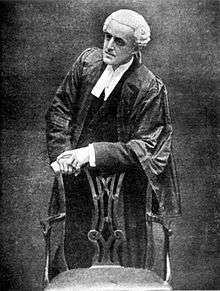Eardley Norton
Eardley John Norton (19 February 1852 – 13 July 1931) was a Madras barrister, Coroner and politician of British origin. He was also one of the earliest members of the Indian National Congress and a champion of civil liberties and rights of the Indian people.
Eardley Norton | |
|---|---|
 Portrait of Eardley Norton at the Madras High Court | |
| Born | Eardley John Norton 19 February 1852 Madras Province, India |
| Died | 13 July 1931 (aged 79) Bexley, Kent, England |
| Nationality | United Kingdom |
Early life
Eardley was born in India in 1852, the son of lawyer John Bruce Norton, who later served as the Advocate-General of Madras. He received his education in England.[1][2] He matriculated on 15 October 1870 at the age of 18 and graduated in arts from Merton College, Oxford.[3] He studied law at Lincoln's Inn and was called to bar in 1876.[3] In 1879, he set sail to India to practice in the Madras High Court.[1]
Practice in Madras
Eardley Norton practised as a lawyer in Madras from 1879 to 1906.[1][4] Norton was elected to the Imperial Legislative Council (India) in 1894 but had to resign within a month due to an adultery suit against him.[5]
In 1897, a furor was raised over the appointment of a lawyer V. Bhashyam Aiyangar as Advocate-General of the Presidency.[6] Norton suggested that it was better to seek the opinion of the Bombay Bar over it and his suggestion was implemented.[6]
Norton was a close friend of G. Subramania Iyer, who founded The Hindu.[5] He wrote a column in The Hindu called "Olla Podrida" under the pseudonym Sentinel. This column ran from May 1889 to December 1889.[5] Norton started the Indian Aluminium Company for the manufacture of utensils in 1900.[7][8]
Indian National Congress
Norton was associated with the Indian National Congress right from its early stages. He participated in the 1887 session at Madras in the course of which he made a much acclaimed speech defending his support for Indian nationalists and association with the Congress.[9] He also organised a magnificent reception for the visiting dignitaries along with the Governor Lord Connemara and the sheriff of Madras, S. Ramaswami Mudaliar.[10] As an outcome of the Madras session, Norton was appointed member of the committee which drafted the constitution of the Indian National Congress.[11] Norton declared that British Parliament had become indifferent to the sufferings of Indians and expressed shame at the fact that Britain had not fulfilled its promises to India.[12] Norton also participated in the tenth session of the Indian National Congress held in Madras in 1894[13] and the Mysore session of the Indian National Congress held in 1903.[14]
Norton was instrumental in enlisting the support of Charles Bradlaugh, Member of British Parliament for Northampton for the creation of a UK chapter of the Indian National Congress.[15][16] Accordingly, the UK-wing came into existence in July 1889 under the leadership of Bradlaugh who was accorded the title "Member for India".[17] Norton was also part of the Congress' first deputation to England in 1889.[18]
Death
Eardley died on 13 July 1931 at Bexley in Kent.[19]
Legacy
Norton stayed in Mandaveli, Raja Annamalaipuram. There is a road in Mandaveli, Raja Annamalaipuram named after him.
Norton was frequently accused of sedition by his fellow countrymen. Once he responded:
If it be sedition, gentlemen, to rebel against all wrong, if it be sedition to insist that the people should have a fair share in the administration of their own country and affairs, if it be sedition to resist class tyranny, to raise my voice against oppression, to mutiny against injustice, to insist upon a hearing before sentence, to uphold the liberties of the individual, to vindicate our common right to gradual but ever advancing reform – if this be sedition. I am right glad to be called a seditionist; and doubly, aye trebly, glad when I look around me today to know and feel I am ranked as one among such a magnificent array of seditionists[20]
Notes
- The Indian Review. G. A. Natesan & Co. 1931. p. 531.
- P. Kaushik, Harish (1996). Indian National Movement: The Role of British Liberals. Criterion Publications. p. 114.
- Foster, Joseph (1888–1892). . Alumni Oxonienses: the Members of the University of Oxford, 1715–1886. Oxford: Parker and Co – via Wikisource.
- The Madras Law Times: Law Notes and Notes of Cases of the Madras High Court and of the English Law Courts By Judicial Committee, Burma, High Court of Judicature, High Court, India, Great Britain, Privy Council. Madras Law Times Office. 1907. p. 82.
- S. Muthiah (13 September 2003). "Looking back: Willing to strike and not reluctant to wound". The Hindu.
- Mrinmaya Choudhuri (2006). Glimpses of the Justice System of Presidency Towns, 1687-1973. Daya Books. p. 200. ISBN 8189233327, ISBN 978-81-89233-32-7.
- Bagchi, Amiya Kumar (2000). Private Investment in India, 1900-1939: Evolution of International Business, 1800-1945. Taylor & Francis. p. 191. ISBN 0415190126, ISBN 978-0-415-19012-1.
- Penny, F. E.; Lady Lawley (1914). Southern India. A. C. Black. p. 152.
- Besant, Pg 40
- Besant, Pg 51
- Besant, Pg 52
- Besant, Pg 64
- Besant, Pg 187
- Besant, Pg 375
- Indian National Evolution, Pg 127
- Indian National Evolution, Pg 137
- Indian National Evolution, Pg 128
- Indian National Evolution, Pg 136
- Ars Quatuor Coronatorum: Being the Transactions of the Quatuor Coronati Lodge No. 2076, London. W. J. Parre H, ltd. p. 256.
- "British Friends of India". Indian National Congress. Archived from the original on 18 November 2008. Retrieved 14 March 2009.
References
- Amvika Charan Mazumdar (1917). Indian National Evolution. Madras: G. A. Natesan and Co.
- Besant, Annie (1915). How India Wrought for freedom. Adyar, Madras: Theosophical Publishing House.